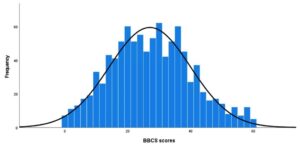Here you can find all information on the construction and validation of the scale. For further questions and suggestions, please feel free to contact us.
Validation of the Scale
The validation of the scale was carried out using the data of 961 family caregivers. Cronbach’s Alpha was calculated to assess the items’ internal consistency and a factor analysis was conducted to determine the structure of the BBCS. In addition, discriminatory power and item difficulty were examined, and the construct validity was established by testing four hypotheses. The associated study was recently published in the journal BMC Geriatrics (DOI: https://doi.org/10.1186/s12877-022-03650-y).
Validation sample
Validation data were collected as part of the study “Benefits of Being a Caregiver”. (For this, approval was obtained from the ethics committee of the Friedrich-Alexander-Universität Erlangen-Nuremberg (No.: 220_20 B)). Subsequently, between 10/2019 and 03/2020, self-report questionnaires were distributed to caregivers who applied for a first-time classification or an increase in care level with the Medical Service (MD). The questionnaires were completed by 1082 family caregivers, of which 121 cases had to be excluded due to the care receivers being younger than 65.
The validation sample included 961 family caregivers, who were on average 61 years old and more than two thirds of whom were women (76.2 %). The majority are partners and adult children (in law) (87.1 %) who supported their relatives. The average age of the care receivers is 77 and 64% are women.
All CRs were living at home and 52.8 % were living together with their CG. The average age of the CGs was 62.10 years (SD = 12.6), 75.7 % were female, 30.5 % were spouses, 59.5 % were caregiving children (in law) or other CGs (e.g. aunts, uncles, nieces, nephews), and 47.7 % were employed. The mean age of the CRs was 82.12 years (SD = 7.0) and 66.9 % were female. The reasons for needing care were for example frailty caused by old age, dementia, strokes and cancer. A total of 37.9 % of the CRs received care due to dementia.
For further information on the sample, see Table 3 of the study “Validation of the Benefits of Being a Caregiver Scale (BBCS) – further development of an independent characteristic of informal caregiving” by Pendergrass et al. (2023).
Distribution
The possible score-range of 0-60 points was completely utilized. The mean score was 27.07 (SD = 12.91) and the median was 27.00.

Other constructs surveyed
In order to assess the validity of the scale, the following constructs were additionally surveyed in the same rating.
| Construct | Rating instrument |
| Subjective burden of caregiver/CG | Short version of the Burden-Scale for Family Caregivers (BSFC-s) (Graessel et al., 2014) |
| Positive aspects of caregiving | Positive Aspects of Caregiving (PAC)-Skala (Tarlow et al., 2004) |
| General coping behavior | COPE 6 Fragebogen (derived from the Brief COPE-Fragebogen) (Carver, 1997) |
| Quality of relationship between CG and CR | Rating by CG current and prior to the need for care as „positive“ or „neutral/negative“ |
| 3 aspects of informal caregiving time: ADLs (activities of daily life), IADLs (instrumental activities of daily life) und supervision | Measurement with one item each according to the Resource Utilisation in Dementia (RUD)-questionaire (Wimo & Winblad, 2003) + average number of hours devoted to it per day |
| Sociodemographic and general characteristics |
Validity
The convergent validity was tested with the hypotheses H1-H3, the discriminant validity with H4 (the hypotheses were based on current findings in the literature).
| Hypothesis | Hypothesis | Hypothesis confirmed | Result |
| H1 | Because the PACS (Positive Aspects of Caregiving) and the BBCS measure similar constructs, the two scales are highly positively correlated | ✓ | Sig. positive correlation between PACS and BBCS (r = 0.75) |
| H2a
H2b |
The CGs‘ Adaptive coping (emotion-focused, problem-focused) tends to Correlates positively with the BBCS sum score
Maladaptive coping (dysfunctional) is not correlated with the BBCS sum score |
✓
✓ |
Sig. positive correlation between BBCS and emotion-focused coping (r = 0.18) and BBCS and problem-focused coping (r = 0.23)
No sig. correlation between BBCS and maladaptive coping (r = -0.05) |
| H3 | A positive current quality of relationship is positively correlated with the BBCS | ✓ | Sig. positive correlation between a current positive relationship and the BBCS (η = 0.20) |
| H4 | There is no correlation between BSFC-s and BBCS | ✓ | r = -0.07 |
- All correlations were hypothesis-compliant ⇒ All hypotheses for convergent and discriminant validity could be accepted
Special features and strength of validation
- Particularly large sample for the validation: Almost 1000 family caregivers in Bavaria were surveyed
- One-factor structure of the BBCS can be clearly demonstrated empirically ⇒ the sum score is justified and the score can be interpreted as an expression of the scope of performance
- Not only applicable to home care situations with dementia, but to all situations that lead to a need for care in older people
Limitations of validation
- The validation sample was based only on family caregivers who provide home care in the sense of caregiving services (Relatives with minor needs for support were not included)
- The validation sample might not be representative of the overall population of informal caregivers (the sample was based on self-selected, German-speaking caregivers)
- Study for validation was based on self-assessments (associated with various risks)